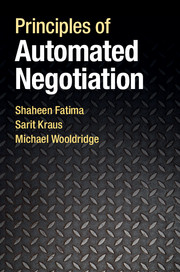Book contents
- Frontmatter
- Dedication
- Contents
- List of illustrations
- Preface
- Acknowledgements
- Summary of key notation
- 1 Introduction
- 2 Games in normal form
- 3 Games in extensive form
- 4 Negotiation domains
- 5 Strategic analysis of single-issue negotiation
- 6 Strategic analysis of multi-issue negotiation
- 7 The negotiation agenda
- 8 Multilateral negotiations
- 9 Heuristic approaches
- 10 Man–machine negotiations
- 11 Axiomatic analysis of negotiation
- 12 Applications
- 13 Related topics
- 14 Concluding remarks
- Appendix A Proofs
- References
- Index
14 - Concluding remarks
Published online by Cambridge University Press: 05 November 2014
- Frontmatter
- Dedication
- Contents
- List of illustrations
- Preface
- Acknowledgements
- Summary of key notation
- 1 Introduction
- 2 Games in normal form
- 3 Games in extensive form
- 4 Negotiation domains
- 5 Strategic analysis of single-issue negotiation
- 6 Strategic analysis of multi-issue negotiation
- 7 The negotiation agenda
- 8 Multilateral negotiations
- 9 Heuristic approaches
- 10 Man–machine negotiations
- 11 Axiomatic analysis of negotiation
- 12 Applications
- 13 Related topics
- 14 Concluding remarks
- Appendix A Proofs
- References
- Index
Summary
This book contains some fundamental results and insights relating to the automation of negotiation. The focus is on competitive negotiations where the outcome (i.e., whether or not an agreement is reached and if so what agreement is reached) depends on the strategies of all parties. We studied how to model and analyse such strategic negotiations using game theory.
From a strategic point of view, there are four key determinants of the outcome of a negotiation:
the negotiation deadline,
the discount factor,
the information that the players have about the negotiation parameters,
the protocol/procedure used for negotiation, and
the negotiation agenda.
We explored a number of procedures and compared them in terms of the properties (i.e., time of agreement, Pareto optimality, uniqueness, symmetry) of their equilibrium outcomes. But this book is not just about strategic negotiations, it is about their automation. In this vein, we examined the negotiation procedures and their equilibria from a computational perspective. The following are the main sources of complexity that can make the automation of negotiation difficult:
The type of issues. In terms of the computational complexity of calculating offers, divisible issues are easier to deal with than indivisible or discretely divisible issues.
The form of utility functions. In terms of the computational complexity of calculating offers, linear utility functions are easier to deal with than nonlinear ones.
- Type
- Chapter
- Information
- Principles of Automated Negotiation , pp. 233 - 234Publisher: Cambridge University PressPrint publication year: 2014



